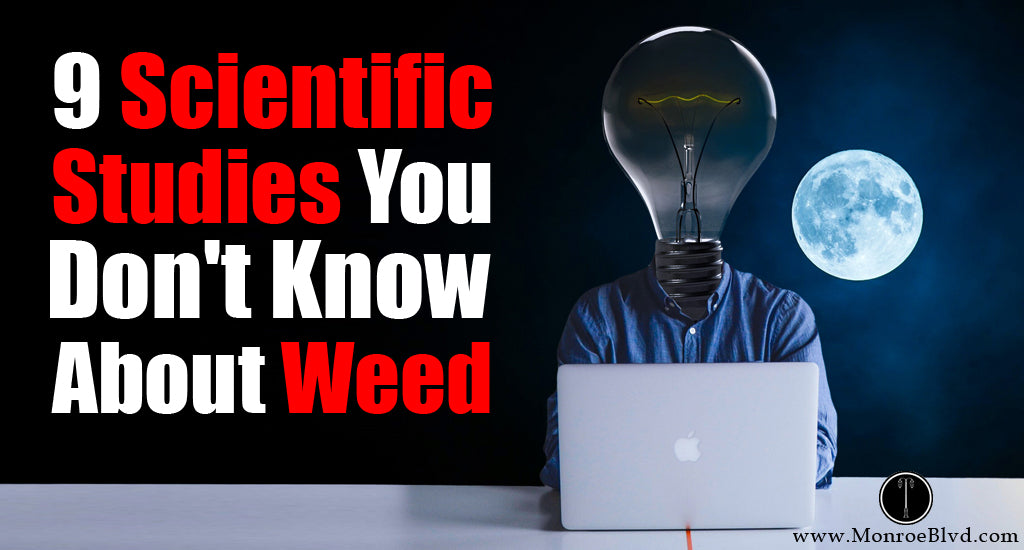
9 Scientific Studies You Don't Know About Cannabis
First: Cannabis for PTSD Treatment Study Approved by the DEA
The Drug Enforcement Agency has granted approval for a groundbreaking study on Post-Traumatic Stress Disorder (PTSD), which will be the first of its kind to utilize the actual cannabis plant rather than relying solely on oils or synthesized cannabis.
The nonprofit sponsor of the research, Multidisciplinary Association for Psychedelic Studies (MAPS), has announced that the approval granted allows the researchers to procure cannabis from the National Institute of Drug Abuse. Once the cannabis has been acquired, they can commence the process of recruiting and enrolling participants, potentially as early as June. The study will include 76 veterans who are experiencing treatment-resistant PTSD, and it will involve the use of different cannabis strains and potencies for comparative purposes.
Related article: 28 Exciting CBD Facts that Will Make You Smile
In 2014, MAPS received a grant of $2 million in Colorado, and subsequently, additional funding of $5.6 million was allocated to several other organizations to facilitate medical marijuana research.
The project will be supervised by Marcel Bonn-Miller from the University of Pennsylvania Perelman School of Medicine, with collaborative work also taking place at the University of Colorado School of Medicine.
Read the original article here.
Second: Study Finds No Increase In Commonness of Cannabis Use Disorders
A recent study published in JAMA Psychiatry has debunked a previously published report from last fall, which claimed that 3 out of 10 cannabis users experience a use disorder. The earlier report also asserted that marijuana use had doubled between 2002 and 2013, but this has been proven to be highly inaccurate.
Researchers at the Washington School of Medicine in St. Louis examined trends in cannabis use and the prevalence of cannabis use disorders during the years 2002-2013. They discovered that while there was a 19 percent increase in self-reported adult cannabis users, the reported problems associated with cannabis actually decreased or remained stable. These findings represent the accurate statistics.
The lead researcher commented, "Certainly, some individuals may face challenges, so we must remain vigilant. However, the situation is not as dire as previously portrayed."
Moreover, separate evaluations of cannabis use among younger populations have revealed that rates of usage among high-school students are notably lower today compared to 15 years ago.
Read the original article here.
Third: Cannabis Might Reduce Dopamine Levels, Study Says
A recent study suggests that long-term, heavy cannabis use can potentially impact the dopamine system, responsible for movement, emotion, and memory. Depletion of dopamine production is linked to the development of Parkinson's disease. Researchers are investigating whether cannabis affects dopamine levels similarly to more potent drugs known to reduce dopamine release.
The study involved 11 adults aged 21-40, who were daily heavy cannabis users. They had started using cannabis at age 16, developed dependence by age 20, and had been dependent for around 7 years. A control group of 12 non-cannabis users was matched with the participants. Most individuals in the study reported daily cannabis smoking in the preceding month. The aim is to understand cannabis's potential effects on dopamine levels and determine if they parallel the impact seen with the heavy use of other drugs.
Using positron emission tomography (PET) scans, the researchers tracked brain activity in regions such as the striatum, thalamus, midbrain, and globus pallidus. Participants were given oral amphetamines before and after the brain scans to measure dopamine release. The findings revealed that compared to the control group, cannabis users showed lower dopamine release in the striatum and globus pallidus. However, it remains uncertain whether the decreased dopamine was pre-existing or a result of cannabis use.
Akhilesh Kumar, a Chief strategy officer at Healing Life - Saving Life, provided an insightful opinion on Quora, "Dopamine is the reward or pleasure molecule that helps you to tide over the stress. Most of the recreational drug and activity leads to a temporary increase in the dopamine which is the reward circuit and may lead to addiction. Marijuana is known to increase in dopamine in short-term use but long-term use has opposite effect on the dopamine level. There is a link between the THC, the psychoactive component of the Marijuana and the dopamine. Long-term abuse of marijuana leads to changes in the brain function which will alter your personality, increase your anxiety, and may depress you."
Read the original article here.
Fourth: Inhaling Correctly for Better Marijuana Consumption
There is a common misconception that larger inhales of cannabis result in more THC intake and stronger psychedelic effects. However, this belief leads to wasted cannabis. To understand a more effective technique, it's important to know that THC absorption begins after the smoke passes the first bronchial split and reaches the lungs' air sacs called alveoli. From there, cannabinoids like THC or CBD enter the bloodstream, travel through the heart, and reach the brain. This process takes less than a minute.
To avoid wasting cannabis, a suggested inhalation technique involves drawing slowly from the vape, pipe, or joint for about two-thirds of the hit and then finishing the inhale with a breath of fresh air on top.
By taking a deep breath and exhaling, you can retain more of the cannabis without losing as much as with regular inhalation methods.
Read the original article here.
Fifth: Athletes’ New Workout Tool
With the legalization of recreational marijuana in some states, residents are questioning whether it is safe to incorporate cannabis into their exercise routines. However, there is limited evidence regarding the effects of marijuana on the human body.
Professional wrestler Robert Szatkwski, known as Rob Van Dam, has shared his personal experience with marijuana. He considers it a life enhancer rather than a performance enhancer, as it has been a significant part of his daily life. Rob often smokes throughout the day, finding it helpful in maintaining a positive mindset when performing in front of large audiences.
The positive and relaxed mindset induced by marijuana can potentially enhance athletic performance by providing athletes with serenity and confidence. However, conflicting studies exist. A 2006 article in the British Journal of Sports Medicine suggested that marijuana caused heaviness, extreme relaxation, and excessive limb fatigue, with potential detrimental effects on lung function. Conversely, a 2012 study published in the Journal of the American Medical Association found no evidence of marijuana adversely affecting pulmonary function, and even indicated that smoking increased lung capacity.
Athletes like snowboarder Ross Rebagliati and former NBA player Cliff Robinson also advocate for cannabis use in sports. Rebagliati, who won the first Olympic gold medal for snowboarding, experienced a brief disqualification when he tested positive for marijuana, which was not yet on the list of banned substances. Rebagliati turned his focus to the medical marijuana business, emphasizing that cannabis improves focus and motivation during workouts. Robinson, known as Uncle Cliffy or Uncle Spliffy, had a successful NBA career but faced suspensions for marijuana use. He now plans to enter the Oregon market to produce marijuana specifically for athletes.
Both Van Dam and Rebagliati emphasize that different strains of marijuana can yield varying effects. Some strains are better suited for high-energy activities, while others are associated with the stereotypical "stoner" couch potato behavior. They caution that consuming excessive amounts of marijuana in one session could potentially lead to significant heart rate issues. Instead, they suggest starting with a small puff to gauge the desired effect.
Read the original article here.
Sixth: Patients with Migraines May Get Help from Medical Marijuana
A recent study published in Pharmacotherapy suggests that medical marijuana could offer relief to individuals suffering from migraines. The study involved 121 participants who experience regular migraines and were treated with medical marijuana between January 2010 and September 2014. Both inhaled and edible forms of marijuana were tested on the subjects. Inhaled marijuana appeared to be the preferred method for migraine sufferers seeking to alleviate current headaches, while edibles were favored by those aiming to prevent migraines.
The findings revealed that a majority of participants (103) reported a decrease in the frequency of their monthly migraines. Some participants (15) experienced no change, and a smaller number (3) even reported an increase in headaches. Overall, the number of migraines among the participants decreased from an average of 10.4 to 4.6 per month, which is considered statistically and clinically significant. Laura Borgelt, one of the researchers involved, cautioned about potential risks and adverse effects associated with medical marijuana, stating that it's important for individuals to be aware of these factors. Nonetheless, the immediate results of the study offer promising prospects.
Read the full article here.
Seventh: NFL Players Seek Medical Marijuana Use
Two former football players are urging the NFL to reconsider its prohibition of marijuana due to the chronic pain associated with the sport. Nate Jackson and Kyle Turley, both former players, argue that marijuana is a safer alternative to prescription pain medications, as it is non-addictive unlike those drugs. The current policy of the NFL is to suspend players if they test positive for marijuana, regardless of its legality in their state.
Citing a 2011 study, it was revealed that seven out of 10 NFL players abused prescription medications provided to them for pain management after games. Despite the existing ban, many players openly admit to using marijuana even after passing drug tests. Nate Jackson estimated that at least half of all active NFL players utilize cannabis for medicinal purposes, a sentiment supported by other former players like Chris Kluwe.
Read the full article here.
Eighth: Study of Twins Finds No Evidence Marijuana Affects IQ
In a groundbreaking study, researchers have discovered preliminary evidence suggesting that marijuana does not have a measurable impact on an individual's IQ. To assess the long-term effects of marijuana on IQ, scientists compared the IQs of twin siblings during adolescence over a period of 10 years. The study involved 789 pairs of adolescent twins, including both marijuana smokers and non-smokers. Surprisingly, the researchers found that both groups experienced a decline of approximately four IQ points throughout the study.
This led the researchers to conclude that factors other than marijuana contributed to the observed decline in IQ. While Nicholas Jackson, the lead author of the study, views this as a significant breakthrough, he emphasizes that further research is necessary to fully understand marijuana's cognitive effects on the brain. Nonetheless, Valerie Curran, a psychopharmacologist at University College London, considers the study to be well-conducted and a valuable addition to the existing literature.
Read the full article here.
Ninth: The Outsourcing of American Marijuana Research
Currently, only three countries in the world, namely Israel, Canada, and the Netherlands, have government-sponsored cannabis research programs. Notably, researchers in Jerusalem made significant contributions to the field by being the first to discover the endocannabinoid system and establish that the human brain produces its own cannabinoids. These groundbreaking discoveries have influenced the medical community's perception of cannabis, leading to the legalization of medical marijuana in certain states in the United States.
Despite the thriving $3 billion medical marijuana industry in the United States, all medical marijuana research is outsourced to Israel. This is primarily due to the classification of marijuana as a Schedule I narcotic by the DEA, making it challenging and seemingly not worthwhile to conduct medical marijuana research within the country. However, numerous influential researchers strongly believe in the potential of cannabis to alleviate a wide range of diseases and ailments, including schizophrenia, diabetes, cancer, eating disorders, Parkinson's disease, Alzheimer's disease, and multiple sclerosis. Unfortunately, due to insufficient funding, these researchers have not been able to conduct human testing.
It is hoped that as public acceptance of cannabis continues to grow, there will be a shift in policies, enabling the U.S. medical community to conduct medical marijuana research domestically without the need for outsourcing.
Read the whole article on Newsweek here.



